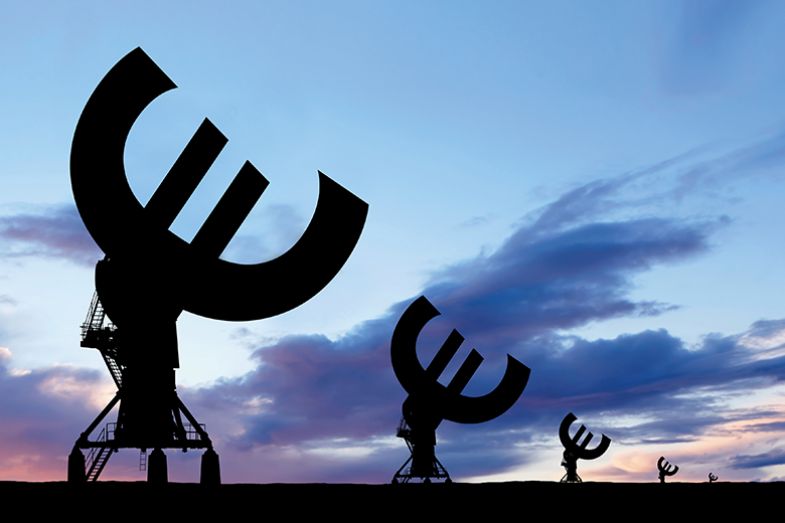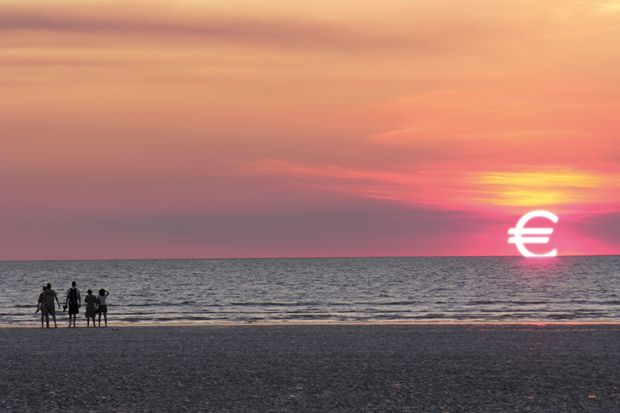While two of Europe’s strongest research nations, the UK and Switzerland, agonise over their future relations with the European Union, and their scientists sweat over whether they will be able to remain involved in the bloc’s research programmes, fierce debate continues on what those programmes will actually look like.
In the last week of September, thousands of academics, university managers, lobbyists and journalists crowded into a former Citroën factory-turned-conference venue in central Brussels to catch up on the European Commission’s latest thinking. Conference sessions, covering everything from gene editing to grant application red tape, were frequently packed out, with queues snaking out the door.
And no wonder. Notwithstanding the UK’s assumed withdrawal from EU membership, the commission has proposed a €100 billion budget for the bloc’s next seven-year funding programme, known as Horizon Europe. That will be the EU’s biggest ever investment in research and innovation if it is ultimately signed off by member states.
Horizon Europe is the ninth of the EU’s so-called framework programmes, the first of which started in 1984 with a budget equivalent to €1.25 billion a year. Since then, the programmes’ coffers have swelled with each iteration, as EU policymakers have come round to the view that research is something that can be done better at the continental level than at the national. In Brussels terminology, research is now a clear case of “EU added value”.
The commission describes Horizon Europe as “evolution not revolution”. As such, some of it will be familiar from its similarly named predecessor, Horizon 2020. Still, like a house being extended and redecorated, Horizon Europe will feel different when researchers move in on the official commencement date of 1 January 2021. Some rooms will be repainted in a different colour, some will be bigger and some will be entirely new.

The biggest addition will be the European Innovation Council (EIC), a €10 billion fund to “turn Europe’s scientific discoveries into businesses that can scale up faster”. The proudest and most prominent legacy of outgoing commissioner Carlos Moedas, the council aims to close Europe’s perceived innovation gap with the US, where new companies can tap into much deeper pools of venture capital than their European counterparts can. A €3 billion pilot has been running since 2018, offering grants of up to €4 million to move high-risk, “radically new technologies emerging from collaborative research” to a point of “commercial viability”, creating new markets.
One strand of the EIC, known as the accelerator, focuses on SMEs (although this could include companies set up by academics), but another strand, the pathfinder, focuses on the early development and commercialisation of highly novel technologies, and it is expected that during the pilot, which will run until 2020, the majority of this €825 million funding pot will go to universities and research institutions.
The EIC will allow researchers to “take the innovation into business, and do something for humanity”, Brussels delegates were told by Ingmar Hoerr, a member of the EIC’s pilot advisory panel, who launched a biopharmaceutical company from discoveries made during his doctorate. They could even bypass publishing their findings in a journal altogether, he said, going straight out into the market.
“Often the hard bit is to convince investors to give you bits and bobs of money to allow high-risk, high-gain [innovations],” added Valeria Nicolosi, another advisory board member and professor of nanomaterials and advanced microscopy at Trinity College Dublin. “This is something that investors are not willing to put their money on because it could be a huge flop.” The point of the EIC is to take such risks.
However, the commercial focus of the EIC is emblematic of what some university lobbyists see as a drift away from the “research” part of EU framework programmes towards the “innovation” part. As if to emphasise the point, self-driving cars and drones were dotted around the Brussels venue where delegates gathered to discuss Horizon Europe. And eyebrows were also raised when the word “research” was stripped from the official title of the new commissioner overseeing Horizon Europe, Mariya Gabriel. Whereas Moedas was known as the commissioner for research, science and innovation, his successor will be the commissioner for “innovation and youth”.
“It’s really important that the entire research pipeline is supported,” urges Jan Palmowski, secretary-general of the Guild of European Research-Intensive Universities, a group of research-driven universities from across the continent, established in 2016. Indeed, his biggest concern about Horizon Europe is a lack of “balance” between research and innovation.
But Moedas himself dismisses fears that Horizon Europe is tilting away from fundamental research in favour of spin-outs and start-ups as a “misconception”. It is “probably our fault”, he concedes, given that the focus of public announcements has been on the EIC rather than the more established European Research Council. But “If you look at the reality, the fact is that the ERC is the place where we are increasing [funding] the most,” he says.
Estimating how much of an increase the ERC will get, though, remains a tricky business. Its core budget during Horizon 2020 was €13.1 billion, which the commission proposes to increase to €16.6 billion in Horizon Europe. This is despite the assumed loss of the UK's previous contribution; if the UK joins the ranks of associated countries, which contribute additional amounts to the core budget, the overall hike could be, proportionally, even greater.
On the other hand, member states, whose budget negotiations are now expected to drag into 2020, could reduce the commission’s proposed budget. Jean-Claude Juncker, the outgoing commission president, has even warned that this protracted wrangling could delay the start of Horizon Europe.

In other ways, the ERC, seen as one of the world’s most prestigious sources of grants for individual scientists, will be “basically untouched”, Jean-Pierre Bourguignon, the ERC’s outgoing president, told delegates in Brussels. The body’s scientific council, composed of independently chosen academics, will continue to have the power to steer its strategy and select evaluators.
Not everyone is happy with that status quo, however. Critics in eastern Europe have repeatedly complained that the ERC’s exclusive focus on the scientific excellence of applications lends an unfair advantage to researchers in the continent’s richer west. A case in point: in the latest round of ERC starting grant awards, Polish researchers won only three out of 408 announced, and only two of these winners will conduct their research within the country. More generally, Poland has won €339 million from Horizon 2020 programmes so far, whereas Germany has hoovered up €7 billion, despite having barely more than double the population of its eastern neighbour.
Sanja Damjanovic, a physicist and Montenegro’s minister of science since 2016, told the Brussels conference that there was also an “enormous gap” between the research “paradise” of western Europe and conditions in the south-east of the continent, including Montenegro – which enjoys an association agreement to participate in Horizon 2020. “All scientific and economic activity is very much slowed down as a consequence. This region suffers...from the strong brain drain: this is our largest economical loss in our region,” she said.
This east-west gap in Horizon 2020 participation (which is also in some cases a north-south gap; Italian researchers, in particular, often conduct their ERC-funded research abroad) was the subject of intense debate in the European Parliament, with Romanian MEP Dan Nica proposing that Horizon Europe should prioritise projects involving countries that have done poorly in the past and should pay researchers the same salary regardless of where they are (currently, salaries are typically based on pay scales at the researchers’ respective institutions).
These ideas have not made it into the final Horizon Europe proposals. But other mechanisms are planned to address the concerns. For instance, there will be extra funding made available if academics from under-represented countries “hop on” – as the commission puts it – to ongoing research projects, the idea being to allow scientists in such countries to break into sometimes closed circles of collaborators in the west.
Overall, 3.3 per cent of the Horizon Europe budget is proposed to be spent on such “widening participation and spreading excellence” tools – triple Horizon 2020’s 1 per cent. Mariya Gabriel, the new commissioner – herself from Bulgaria – has also told MEPs that one of her priorities is to halt a “brain drain” from poorly performing EU states – although with the broad shape of Horizon Europe already agreed, it is unclear how much leeway she will have to make changes.
It is not just academics in former communist countries who have felt neglected by Horizon 2020. Some humanities and social science scholars also feel as though they have been left out in the cold – or only brought in at the last minute to add a tokenistic gloss to otherwise technically focused projects.
According to the most recent assessment, 86 per cent of Horizon 2020 projects have involved a social science or humanities partner, but those disciplines accounted for only 8.5 per cent of the budget. Moreover, social science involvement has been dominated by economics, political science, business and marketing; other social science disciplines, as well as the arts and humanities, have been included in only a “limited” number of projects.
“Rather than being the cherries on the top of the cake, we want to be the cake: we want to be there as equal partners with other disciplines,” Brussels delegates were told by Jane Ohlmeyer, director of the Trinity Long Room Hub Arts and Humanities Research Institute at Trinity College Dublin.
The way that Brussels has tried to involve the humanities and social sciences in Horizon 2020 is by “flagging” up which calls require their input, and then penalising applicants who fail to sufficiently work them into plans. But this system has “come to a dead end”, the Brussels conference was warned by Harald Hartung, head of unit for fair societies and cultural heritage at the EU’s Directorate-General for Research and Innovation. Very often, flagged projects never ultimately included the social sciences, he said, with the result that “beautiful technical solutions” to social problems ended up “in a drawer” because no one has worked out how to put them into practice.
There were discussions within the commission about having a specific “mission” focused on social science and humanities, revealed Hartung. Missions are another innovation adopted by Horizon Europe, constituting a raft of projects across different disciplines designed to achieve “a bold and inspirational and measurable goal within a set timeframe, with impact for society and policymaking as well as relevance for a significant part of the European population”. The humanities and social science mission would have looked at “tackling inequalities through education”. However, “we were not successful in getting it through”, Hartung said. The future focus, instead, will be integrating social sciences from the very beginning of projects, as well as having some specific funding calls on topics related to humanities and social science.
The exact goals of the chosen missions have not yet been set, but they will focus on five different areas: adaptation to climate change; healthy oceans, seas, coastal and inland waters; climate-neutral and smart cities; soil health and food; and cancer. They are proposed initially to account for 10 per cent of the €52.7 billion proposed for what is known as Pillar Two Horizon Europe, focused on “global challenges and industrial competitiveness” (Pillar One is “open science”, which includes the ERC, and Pillar Three is “open innovation”, which includes the EIC).
In one sense, a focus on problem solving through research is not new: Horizon 2020 has already poured billions into tackling what it called “societal challenges”, often in similar areas. But Horizon Europe’s missions will have much more specific aims. The soil mission, for example, might set a goal of reducing land degradation by, say, 10 per cent in 15 years, explains Cees Veerman, a former Dutch agriculture minister, who chairs the soil mission (four out of five mission chairs are former politicians or EU commissioners). “The mission is target-oriented and not principally oriented at the success of publication in scientific journals,” he adds.
Veerman also emphasises that, at least with the soil mission, the focus will not necessarily be on new research because we already have “an enormous bundle of knowledge” about soil degradation. Instead, the goals will be to understand why society fails to take care of soil quality and to raise awareness of the problem – through films, for example. “We have to convince society...that they are part of a process [of soil degradation] that has to change,” he says.
Some lobbyists are worried by the commission’s proposal that if a research project is judged not to be contributing towards the stated mission, it could have its funding cut during the project. But addressing the missions is seen by the commission as key to securing continuing public support for the EU’s ever-increasing research budget. The missions are “about how can you communicate science to people in a way people understand”, says Moedas, the outgoing commissioner. When he arrived in post in 2014, the EU was funding “amazing projects” but “nobody knew about it”, he explains.
The missions are a way to “repair the distance that has been growing in the past 20 to 30 years between science and society”, Veerman adds. “The authority of science is surely under siege.”

If there is one thing the public do know – or think they know – about EU funding, it is that it comes with a lot of bureaucracy.
Even though efforts were made to ease the paperwork associated with Horizon 2020, its grant agreements are still 846 pages long. “Maybe specialists from research institutes or universities can swallow 846 pages,” the Brussels conference was told by Alex Brenninkmeijer, a member of the European Court of Auditors, which has run the rule over the programme’s red tape. But, for SMEs, such a long document is indigestible, he said.
This has not gone unnoticed by Brussels policymakers, and while red tape-cutting measures are yet to be finalised for Horizon Europe, pilots are currently being run of what is termed a “lump sum” payment system. The idea is that instead of filling in time sheets, being subject to financial audits and retrospectively claiming money from the EU for work already done, researchers will estimate the cost of a project up front and then be left to get on with their work.
“This is really essential,” said Olivier Waelbroeck, director of the commission’s Central Financial Service, to delegates in Brussels. “It allows the research to focus on the results and the outcome and not to spend time on administration and checking bills.”
But there are fears of unintended consequences. One is that research teams might try to undercut each other on cost, perhaps by being cross-subsidised by their universities. Another, according to Enora Bennetot Pruvot, deputy director of governance, funding and public policy development at the European University Association, is that it could make researchers more risk-sensitive about bringing in new partners, in case they exceed the pre-agreed budget. Other worries expressed by EUA members include whether the agreed upon budgets will actually cover the incurred costs, and how the commission's intention to make payment dependent on results will be administered.
Moreover, some fear that the need for detailed ex ante cost estimates may increase the amount of work that will need to go into grant applications – most of which will be unsuccessful. The EUA has estimated that academics have spent €5.8 billion on failed Horizon 2020 bids (success rates for the ERC, for example, come in at between 11 and 13 per cent, depending on the grant).
Instead, the EUA wants the EU to focus on other forms of simplification, such as accepting universities’ already existing accounting practices. Waelbroeck confirmed that avoiding double-auditing will be a priority in Horizon Europe: “We have set out a very simple principle. You should ask for the same information only once.”

If Brussels’ bureaucratic image contributed to the UK’s troubled decision to leave the EU in 2016, it is coming back to haunt officials as the UK’s departure introduces further complications to be resolved before Horizon Europe can be finalised. Of course, if the UK’s forthcoming general election produced a political realignment that ultimately saw it decide to remain in the EU, that would increase the bloc’s budget considerably. But the long agony of its withdrawal is also complicating the finalisation of the rules for how non-EU members (known as third countries) will be able to participate in Horizon Europe – as nations such as Switzerland, Norway and Israel do in Horizon 2020.
The forthcoming programme was designed “to make it possible for the UK to be there” as an “associated country”, Moedas says, and he has “been advocating very loudly that the UK has to be in it”. But without some higher-level clarity on the UK’s future relationship with the EU, Brussels says it cannot discuss the UK’s involvement.
The same is true of Switzerland, another major European research power, which potentially faces its own “Brexit moment” if it votes in a May referendum to end free movement from the rest of the EU. When Swiss voters decided in 2014 to impose quotas on free movement from other EU countries, the Alpine nation was excluded for two years from many Horizon 2020 programmes, including the ERC, until it subsequently watered down its immigration controls.
Among the issues to be resolved is how much associated countries should pay into the EU budget. In Horizon 2020, associated countries pay a contribution based on their GDP; if their researchers win lots of grants, they can more than recoup their money. But for Horizon Europe, a “pay as you go” model has been put on the table by the commission. This would mean associated countries paying in roughly what their researchers get out. As Moedas puts it: “Countries should not associate themselves to Horizon Europe to make money or to lose money. The point here is not the money.”
The proposed change, in theory, is fair, thinks the Guild’s Palmowski, but it creates unlimited liabilities for associated countries. “In other words, you will have to pay for however much your researchers get, so there’s a bottomless pit, almost, as far as finance ministries are concerned,” he says. “That’s going to make it very difficult for a number of third countries.”
With the rules unclear and time running out, there are fears that no association agreements will have been finalised by the time Horizon Europe begins (assuming the programme does begin on time). Nor are there any concrete signs just yet that other further-flung nations, such as Canada, Australia or South Korea, will be able to associate, as had been mooted.
Moreover, it may be that associated countries will still be excluded from certain parts of Horizon Europe if that is deemed to be in the bloc’s interests. According to Palmowski, the European Parliament has suggested that the no-go areas could include the ERC or EIC. He also notes that during her confirmation process through the parliament, Gabriel – whose own position is yet to be ratified – said that such limits should be adopted if this is in “the EU’s strategic interests”. Palmowski suggests that this could occur if the prestige lent to European research by the participation of the likes of the UK, Switzerland and Australia is deemed to be outweighed by such countries’ enhanced allure to EU researchers if they have Horizon Europe access, promoting a brain drain from member states.
So while it is clear that Horizon Europe will be characterised by more money for spin-outs, specific social missions and less red tape, it remains very much up for grabs who exactly will take part, on what terms and with how much money. Researchers across the continent and beyond will be on tenterhooks for some time yet about their future funding prospects as these issues are thrashed out amid all the political noise.
后记
Print headline: Looking to new horizons




